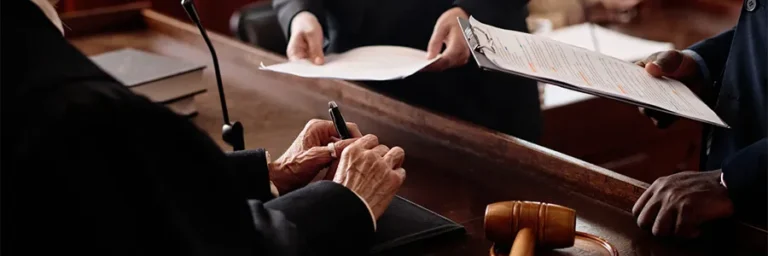
Every claimant, in order to have a hearing before an administrative law judge, must receive an initial denial by the Social Security Administration (SSA), and a second denial at the request for reconsideration stage. All appeals must be filed within 60 days of the initial and reconsideration denials. After a timely appeal in response to the reconsideration denial is filed, the case is transferred from the local SSA office to the Office of Hearings Operations, where it gets assigned to an administrative law judge. Once assigned, the case is scheduled with the administrative law judge and disability claimants receive a Notice of Hearing. This hearing notice provides sufficient time to obtain and submit all evidence relevant to the case.
What Happens During a Disability Hearing?
The administrative law judge (ALJ) puts forth questions to the claimant
At the hearing, the disability claimant will testify regarding their work history, impairments, how their symptoms impact their day-to-day life, and why they feel they are unable to work. The judge will listen to testimony and review all the medical records in the claim, supporting statements from treating physicians and family members, and any prehearing written legal briefs submitted by the attorney representative. Most cases involve hundreds or even thousands of pages of medical records, so many judges require time after the hearing to review the records and testimony and to write the lengthy legal decision.
Many hearings end with the judge advising the attorney and claimant that all evidence will be considered and a written decision will be released after the hearing, without issuing a final decision on the record at the hearing. As many attorneys can attest, no matter how well a hearing goes or how nice or sympathetic an administrative law judge’s manner is at the hearing, we cannot know the outcome of a case until we get it in writing.
The attorney also conducts direct examination
The attorney is also responsible for asking the client direct questions while the judge listens. The attorney will elicit the strong points of a case, highlighting the evidence that falls under the SSA definition of disability, and attempt to explain any weaknesses in the case.
The judge and attorney can question witnesses (i.e., medical experts or vocational experts) to testify about the disability
During the hearing, the judge and attorney will also question the vocational expert, who is hired by the Social Security Administration to testify regarding jobs in the national economy for people with disabilities, including what types of workplace limitations jobs allow and do not allow. In some cases, the ALJ will also call a medical expert to testify at the hearing. The medical expert’s testimony usually takes place at the beginning of a hearing, while the vocational expert’s testimony takes place at the end. The medical expert is a doctor who will review the medical evidence and testify regarding a disability claimant’s impairments, whether these impairments meet a Social Security medical listing (the definition of a disability under SSA rules), and the expected workplace limitations resulting from the impairments.
5 Signs That You Won Your Disability Hearing
In the following part of the article, will we discuss the 5 signs that show your disability hearing went in the best way possible and will likely result in a favorable decision by the judge.
The judge poses only one or no questions to the vocational expert
At every adult disability hearing, the judge will pose questions to the vocational expert regarding a claimant’s past relevant work. The judge will then pose hypothetical questions to the vocational expert with hypothetical workplace restrictions, typically beginning with the least restrictive workplace limitations. The vocational expert responds by listing jobs in the national economy available for workers with these restrictions.
It’s important to note that the vocational expert is not a judge or a doctor, and does not have access to a disability claimant’s medical file. Therefore, when they are providing testimony with examples of jobs, they are not telling the judge that a disability claimant can perform the specific jobs listed, for example, a cashier or parking lot attendant. They are only providing the judge with expert testimony regarding the impact of certain work restrictions on a person’s ability to perform jobs. Most judges will finish questioning the vocational expert by posing a workplace restriction that results in the vocational expert testifying that no jobs exist in the national economy for a person with such a restriction.
While this testimony is encouraging for the claimant to hear, it’s again important to remember that the vocational expert is not making the decision. The judge is responsible for determining what types of workplace restrictions a claimant would have given their medical record and testimony. The vocational expert is present at the hearing to develop the record and give the judge a basis for the decision. Therefore, when a vocational expert testifies that no jobs exist in the national economy for a person with certain types of workplace restrictions, this testimony does not hint at a favorable outcome.
With the vocational expert testimony, the judge is mostly developing the record by establishing which workplace limitations still allow for jobs in the economy, versus workplace limitations that preclude all work. However, when a judge only poses one hypothetical question to the vocational expert — for example, a hypothetical based on the supporting opinion from a treating physician — this is usually a good sign for the outcome of the hearing.
The judge is satisfied with a few questions and stops the attorney for further substantiating the case
In many hearings, the judge will ask the attorney to present the majority of the case. This involves making an opening statement, presenting legal arguments with citations to the medical evidence, and a direct examination of the client to elicit the strong points of the claim. When a judge cuts off the attorney during a line of questioning with the phrase “Okay, counsel, I think I understand this case” or “How about we proceed directly to the questioning of the vocational expert, then see if we need more testimony from the claimant?”, it is generally a positive indication. With comments like these, the judge signals that they have reviewed the case, understood the arguments, and can make a decision without extensive questioning of the claimant. At every hearing, judges must give disability claimants the opportunity to testify regarding their impairments, and the failure to do so is an appealable issue in the event of a denial. Therefore when a judge cuts off the attorney after only a few questions, it’s generally a positive sign.
The medical experts support the claim
In some cases, the judge will decide to appoint a medical expert to testify. The medical expert’s job is to review the relevant medical records submitted prior to the hearing and to testify at the hearing whether a claimant’s impairments meet or functionally equal the criteria of SSA’s Listings. When a medical expert testifies at the hearing that a listing is met or medically equaled, this is a good sign for the hearing outcome.
However, it’s important to note here that the judge is not bound by the testimony of the medical expert. Judges have a wide degree of discretion in administrative law, and they can choose which medical opinions to assign probative weight to. In our experience, when a medical expert testifies that a listing is met at the beginning of a hearing and the judge does not take further testimony from a claimant or the vocational expert, this is a very positive sign for the outcome.
The judge hints at support
Age is a major factor in Social Security cases. Some rules direct a finding of disability when a disability claimant turns 50, 55, and 60 years old. Sometimes a judge will note to the attorney that a claimant changed age categories during the relevant time period, and that a specific Grids Rule applies to the case. In general, this is a good sign at the hearing. Nevertheless, it bears repeating that the decision is not final until it comes in the mail in writing.
Another good sign is when the judge mentions the severity of the objective evidence, such as an MRI study or X-ray, or when the judge notes that a treating physician has given a compelling opinion regarding disability.
The judge issues a bench decision during the hearing
This is the best possible outcome on the hearing day. When a judge issues a bench decision, it means that the case is approved. The judge will read the decision into the record, rather than proceed with claimant and expert testimony. If the judge issues a bench decision, the claimant and attorney do not need to wait any longer to know the outcome. A favorable bench decision is the only instance in which the outcome is determined before receiving the written decision in the mail after the hearing.
4 Signs That You May Have Lost Your Disability Hearing
Don’t panic if you think your disability hearing didn’t go well. As with the positive signs discussed above, the negative signs discussed below do not indicate that an unfavorable decision is guaranteed. If you had a grumpy judge, an uncharitable medical expert, or a vocational expert listing multiple jobs available for people with your workplace limitations, this does not necessarily indicate an unfavorable outcome. Judges have tough jobs and sometimes have bad days. If you feel the judge did not believe your testimony or asked a lot of tough questions, you might have just caught the judge on a bad day, just like anyone else.
The judge expresses skepticism of your testimony
Some judges, when they sense a claimant is embellishing or exaggerating testimony, will express skepticism. For example, if a judge asks whether a claimant can drive, and the claimant states on the record, “No, I cannot drive,” the judge may follow up with a question about how the claimant attends doctor’s appointments or how the claimant traveled to the hearing that day. When the medical record doesn’t support the inability to drive, the judge may ask the attorney to cite evidence supporting this testimony. If the record does not support the inability to drive, the claimant has just lost credibility.
Many attorneys advise their clients to be honest about their capabilities and to only respond to the specific question. So in this driving example, if a claimant is able to drive but only does so on a limited basis, they should respond “Yes” to the question of “Can you drive?” The judge may then follow up with a question such as “Is there anything about your medical condition that limits your ability to drive?” Then the claimant can provide further explanation. The quickest way to derail a hearing is to offer false testimony to the judge about a minor issue such as driving (SSA’s definition of work is the ability to perform full-time, eight-hour per day, five-day per week work, so a claimant can be capable of driving and still be eligible for disability). If the judge believes a claimant has fabricated or embellished something such as their ability to drive, the rest of the testimony will not be credible.
Again, it’s important to reiterate here that the mere fact that a judge expresses skepticism does not mean the case will be denied.
The record was not complete
The burden of proof is on the disability claimant to prove they are eligible. This is accomplished primarily through medical records. Therefore, it is crucial to submit all medical evidence, both favorable and unfavorable, to the judge at least five business days prior to the hearing. If the judge does not have a complete record or is missing important updates, this is a sign that the hearing did not go well.
Often, an incomplete record will result in delays including post-hearing interrogatories or the scheduling of a supplemental hearing. These types of delays frustrate judges because of the backlog of people waiting for their disability hearing. The hearing time for an unprepared claimant could have been offered to a claimant who is prepared with updated medical records and a complete case. However, it’s important to note that sometimes an incomplete record is inevitable, such as in instances where an important test was completed a few days prior to the hearing and could not be obtained within five days.
Perhaps there were loopholes in the medical records that weren't addressed
Each disability case is unique, and most cases have at least one “bad fact” in the record. Examples include evidence of drugs or alcohol, a failure to follow doctors recommendations, work after the alleged onset date, or a doctors examination that does not accurately depict the level of impairment. In many cases, the so-called “bad fact” has a perfectly reasonable explanation, or at least can be put into a larger context for the period of disability alleged, such as a brief period of improvement. Many judges would prefer to hear the claimant’s explanation rather than have a bad fact go unaddressed at the hearing. An attorney will prepare the claimant for questions regarding the “good facts” and “bad facts” in the record. When these facts are not addressed, the judge may cite them in the unfavorable decision.
The disability lawyer is concerned about the ALJ or the claim
Disability attorneys explain Social Security regulations that pertain to their client’s claims, including which rules direct a finding of disability or unfavorable opinion. This is especially important at the hearing level, because of the principle of administrative finality. When a judge makes an unfavorable decision, the Social Security Administration will make the presumption going forward that the judge correctly decided the case. Therefore, any subsequent application for disability after a judge’s denial will be met with something called “the presumption of continuing nondisability.”
In challenging cases with a limited chance of success at the hearing, the attorney will discuss the right to withdraw the application for disability, which results in a dismissal rather than an unfavorable decision on the merits. Sometimes, this is in the client’s best interest, since having an unfavorable judge’s decision on the merits increases the challenge of proving disability on a new application. It’s important to have this conversation with the attorney prior to the hearing.
What To Do If You've Lost Your Disability Hearing
The case goes to the Appeal Council
If the judge denies your case, you have a right to file an appeal with the Appeals Council. An appeal must be filed within 60 days of the unfavorable decision. Talk to your attorney about the merits of the appeal process, the timelines for an appeals council decision, and your right to file a new application if the appeals council denies your appeal.
The case goes to the Federal District Court
If the Appeals Council denies your request for review of the ALJ Decision, you have a right to file a lawsuit in Federal District Court. Such a lawsuit must be filed within 60 days of the date of the unfavorable ALJ decision. If you are denied at the Appeals Council level, talk to your lawyer about the merits of your appeal.
Do You Need a Disability Attorney?
Yes, statistics are in support of legal representation. An attorney representative will help you win your case. A study from the US Government Accountability Office showed that people who had an attorney representing them were three times more likely to win their case than people who did not. An attorney can review your medical record, collect all missing records, and submit them to the Social Security Administration. The attorney is familiar with the SSA’s rules and procedures and will be your advocate and explain to the SSA why you are disabled. If your case reaches the hearing level, attorneys have experience appearing before judges and will prepare you and advocate for you at the hearing before the administrative law judge. The attorney representative will be there to explain all relevant issues in your case and keep you informed at each step of the process.
LaPorte Law Firm Expertise
At LaPorte Law Firm, we solely specialize in Social Security disability cases and know the Social Security system inside and out. We have experience representing thousands of people at all stages of the Social Security disability process. If you would like to talk through your case with one of our attorneys, please give us a call for your free consultation.
FAQ
Every judge and hearing office is different, however, expect the decision to arrive in the mail 1–2 months after the hearing. The judges are not given deadlines for decision writing, and due to staffing or backlog issues, the decision may take longer than 1–2 months in some cases.
The fully favorable decision is sent from the hearing office to the local Social Security office to process and release an “Award Letter.” The Award Letter discusses the retroactive payment amount, attorney’s fee, and ongoing monthly benefit. The fully favorable judge’s decision does not discuss the back pay or monthly benefit.
The judge will send you a request to show cause for failing to appear at the hearing. If you have a good reason for missing the hearing, such as a medical emergency, the judge will reschedule the hearing. If the judge finds that you did not have a good reason for missing the hearing, your case will be dismissed.
The Appeals Council has jurisdiction over ALJ Decisions and will occasionally review fully favorable decisions for legal errors. In a small percentage of cases, the Appeals Council will overturn the favorable decision from a judge and order a new hearing. In those cases, you have the right to receive interim payments if the new decision is not issued within 110 days of your initial favorable decision. If you receive an Appeals Council remand order after a judge approves your case, contact an attorney right away.














